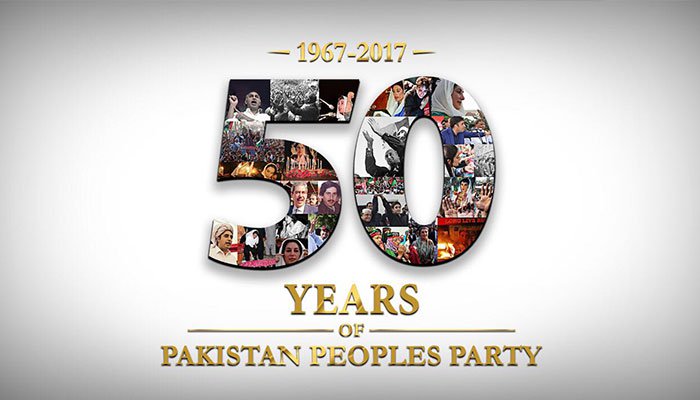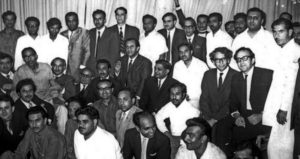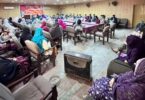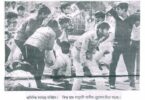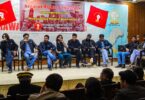By Lal Khan
On November 30th, 1967 the founding convention of a new political party was organised by left-wing political activists in Lahore. Most were students having greater ideals and an audacious mind-set to go beyond defunct reformist ideas in the progressive movement and overthrow this system of tyranny and oppression. Under Ayub Khan’s military dictatorship, albeit in a civilian garb, the state’s repression was remorseless and brutal. Governor of Punjab, Amir Mohammad Khan, the Nawab of Kalabagh, was a ruthless despot. Stringent obstacles and repressive measures were imposed to sabotage this meeting despite the official media’s pretence of this being a paltry affair. Several prospective delegates were barred to attend this ‘Founding Convention’ while some refrained to defy the odds. On that fateful autumn morning of a much less polluted Lahore, the convention began with a tinge of optimism in the air.
After two days of deliberations on the eve of December 1st, a new party, the Pakistan Peoples Party and its Founding Documents were launched. Zulfiqar Ali Bhutto, who was elected its chairman, gave a passionate speech with a revolutionary message to close the convention. The Founding Document outlined the basic aims and objectives of the party. It was perhaps the most radical programme of any left-wing party in South Asian subcontinent’s history since 1947. Although the subsequent leaderships’ abandoned and obfuscated these tenets few in today’s generations are aware of its historical worth. This programme of revolutionary socialism propelled the PPP to become the largest party in Pakistan. Some of its most salient features are quoted here from the original document.
- The ultimate objective of the Party’s policy is the attainment of a classless society, which is possible only through socialism in our time.
- Pakistan Peoples Party solemnly pledges to the people that the Party will endeavour by all means, with or without elections, to fulfill in practice the programme contained therein.
- The real problems that confront the nation are political and economic, but not religious, since both exploiters and exploited profess the same faith–both are Muslims.
- Direct colonial rule left behind as its legacy a social and economic order in Pakistan, which could be defined, as feudal-military-bureaucratic. All the progress since has been its transformation into a dependent capitalist system typical of underdeveloped countries within the imperialist neo-colonialist power sphere.
- The corruption is only a symptom and not the cause of the disease.
- The crisis is in the bones of our rotten system. The Pakistan People’s Party will abolish the system itself, seizing the means of production, which in the hands of the privileged few are the means of exploitation.
- A constitution of merely democratic form will not meet the needs of this country unless it is so framed as to allow and, indeed, initiate changes in the economic and social system. It is unlikely that so long as the vested interests of capitalists and propertied classes remain unchecked anything but a constitution tailored to suit them will be the outcome.
- The true solution lies in adopting a socialist plan to transform the economy of the whole of Pakistan, stopping exploitation and utilizing available means to develop the country without capitalist intervention.
- All production of wealth is the result of human labour. All major industries, banks and insurance companies will be nationalized.
- Younger generations have to be prepared not merely to understand the universe around them but to alter it. They must acquire a deep comprehension of the nature of social change and of inexorable process of history. In order to create a truly classless society it is imperative that their horizons should encompass society as a whole.
- The Party stands for elimination of feudalism and will take concrete steps in accordance with the established principles of socialism to protect and advance the interests of the peasantry.
- Since all the important large-scale industries will be nationalized, it will be possible to offer the workers genuine participation in enjoying the fruits of industrial production. Participation of workers and technicians in factory management will be progressively introduced.
- The socialist regime will need a different structure of administration, and the socialist society, when it comes into being, will itself create the necessary structure.
- The health programme will include the provision and improvement of hospitals, the enforcement of measures to improve sanitation in towns and villages.
- A ‘Peoples Army’ will be created in all regions of the country. This will offer the substitute for the defence in depth, which is geographically lacking. The existence of a people’s army is the best deterrent to foreign aggression.
- The existing electoral system is a most efficient mechanism for giving preponderance to the propertied classes in parliament. The cost of fighting an election is high which in no case a poor candidate can afford unless rich patrons with ample private means support him.
- The Party proposes radical change of the social economic and political structure. The people of Pakistan will themselves bring this revolution to pass.
On its 50th founding anniversary, PPP’s present leadership has conflicting policies and antagonistic class interests from those inscribed in the party’s founding documents. These leaders have embraced capitalist economics, marauding imperialist investments and privatisations in the name of Public Private Partnership. Politically they are vying to get in power by any means and protect this despicable status quo in the name of democracy. Their financers are swindlers complicit in plunder and extortion. These lumpen upstarts call the shots and make crucial decisions. Ideas of Revolutionary socialism are spurned in the party’s ranks.
It was this very ideology that brought PPP into the leadership of 1968-69 revolution; the most audacious upheaval in post-partition South Asia. The masses traditionally aligned to PPP are in despair and revulsion against this ideological betrayal. The original PPP had dared to challenge the capitalist order. The present caricature fervently appeases existent system and its state. This system’s savagery is devastating the oppressed. Masses are yearning for a change. A fresh revolutionary upheaval shall cleave the party and society on class lines, carving out the Leninist party to accomplish a socialist victory— as envisaged in PPP’s founding document.
